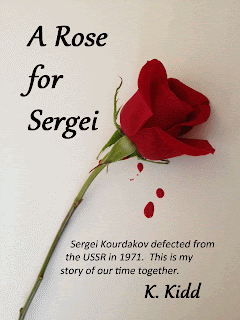I had hoped to have the electronic version of A Rose for Sergei available by now. My editor-daughter did warn me about all the
time involved with writing/editing/publishing.
It is definitely taking a lot longer than I ever imagined. I was advised by a few experienced authors to
make sure I had several people proofread my manuscript before publishing. I needed different people to check for
specific items: typos, dates,
formatting, flow, continuity, etc.
I realize that asking someone to proofread an
entire book is a huge undertaking. My
friend and former co-worker, Suzanna accepted the challenge. After all, she was the one who kept telling
me that I needed to write about Sergei.
She was an excellent choice—we often proofed each other’s papers at
work. I asked her to check my formatting
and look for any misspelled words, and then I didn’t hear back from her for
several weeks. I started to get
worried. Uh-ohhh, I thought.
Problems? I was relieved when I
finally got an e-mail.
Anyway,
I finished your book a couple of nights ago and
then have thought about it for a few nights.
I think your book shows Sergei in such a lovely light. What a kind, caring person he was—how much he
changed. I think you accomplished your
goal by coming across how you must have been at 21. Young and feeling like nothing bad ever
happens to anyone . . . . It speaks to
every young person’s take on life. How
they think everyone lives forever. I
didn’t cry . . . because I knew what was coming, but your reaction to his death
came across as raw and emotional—it has stuck with me. Also, I appreciate all of the references to
the time period. It was a neat insight
into how men and women treated each other, bosses and secretaries, etc.
When I started the book, I was set on looking
for formatting errors. I found just a
couple of small things. As I became
engrossed in your story, I forgot to look for errors!
Not to
worry, I thought. I do have other proofreaders. The fact that Suzanna was so absorbed in my
story that she forgot everything else was actually good news. I could not have asked for a better book
review.


